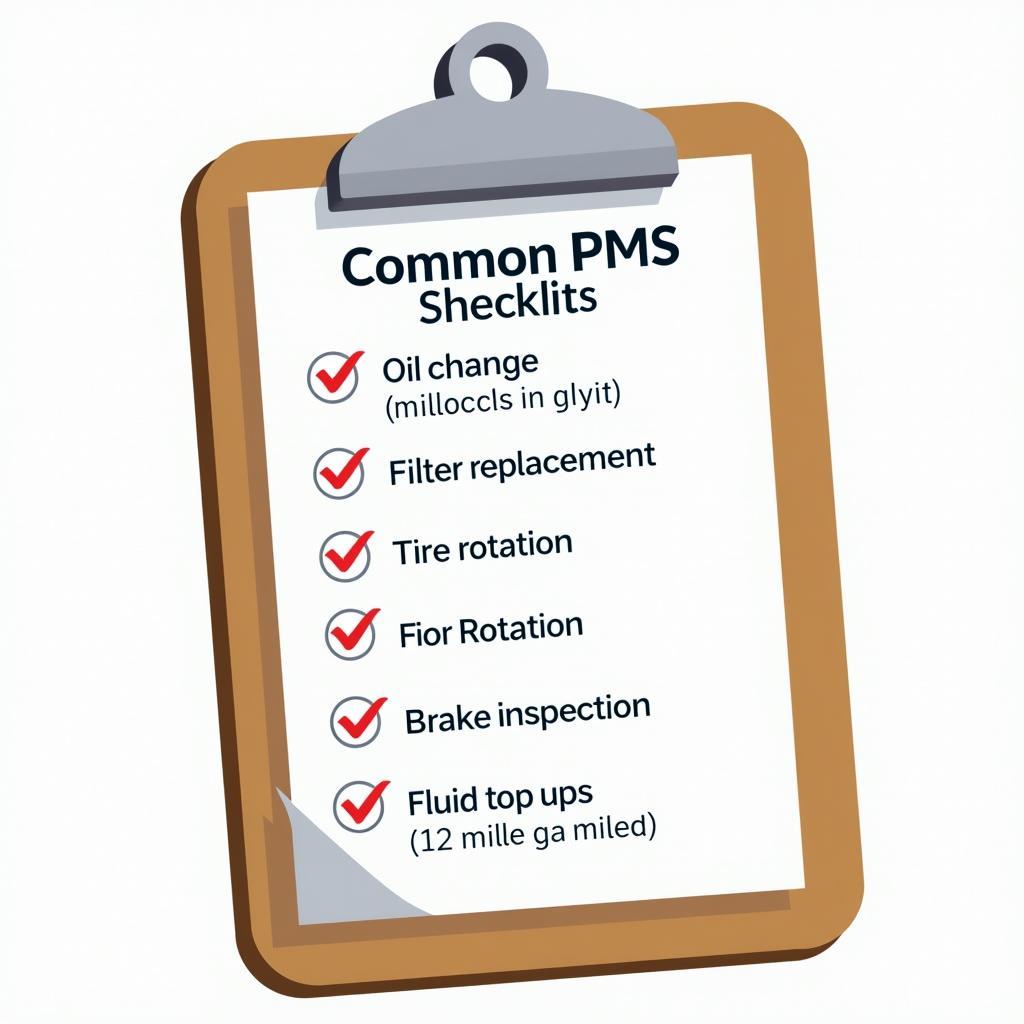Preventative Maintenance Service, or PMS, is crucial for keeping your vehicle running smoothly and avoiding costly repairs down the road. It’s a proactive approach to car care that involves regular inspections, adjustments, and part replacements based on time or mileage intervals. Understanding what PMS entails can save you money and extend the life of your car.
A PMS schedule typically includes routine checks like oil changes, filter replacements, tire rotations, and brake inspections. These services are designed to catch potential issues before they become major problems. For instance, regularly checking your car’s fluids can prevent engine damage caused by low levels. Having your tires rotated helps to ensure even wear and tear, improving handling and extending tire life. Do you know how long does it take to service a car? Understanding the time commitment involved can help you schedule your appointment effectively.
Why is PMS Important?
Regular PMS offers numerous benefits, impacting both your wallet and your safety. By addressing minor issues early on, you can prevent them from escalating into expensive repairs. Consistent maintenance also improves fuel efficiency, reduces the risk of breakdowns, and enhances your car’s resale value.
What does PMS include?
The specific services included in a PMS vary depending on your car’s make, model, and age, as well as your driving habits. However, some common PMS tasks include oil changes, what is oil flush in car servicing, air filter replacement, spark plug replacement, fluid top-ups (brake fluid, coolant, power steering fluid), tire rotation and balancing, brake inspection and pad replacement, battery check, and inspection of belts and hoses. Understanding what is cooling system service in car can help prevent overheating and other costly repairs.
How Often Should I Get a PMS?
Most manufacturers recommend a PMS every six months or every 5,000-7,500 miles, whichever comes first. However, it’s best to consult your owner’s manual for specific recommendations for your vehicle. If you drive in harsh conditions or put a lot of miles on your car, you might need more frequent servicing.
What are the signs my car needs a PMS?
While adhering to a regular schedule is important, there are also signs your car might need a PMS sooner than expected. These include unusual noises, vibrations, warning lights on the dashboard, decreased fuel efficiency, or changes in handling. Addressing these issues promptly can prevent more serious problems and ensure your safety on the road. Wondering will my car run better after a service? A properly executed PMS can definitely improve your car’s performance.
Finding a Reliable Car Service Provider
Choosing a trustworthy mechanic is crucial for ensuring your car receives proper PMS. Look for certified technicians with experience working on your specific make and model. Ask for recommendations from friends and family, and read online reviews. A reputable service provider will be transparent about their pricing and services, and they will be happy to answer your questions.
“Regular preventative maintenance is an investment, not an expense,” says John Smith, ASE Certified Master Technician. “By addressing small issues early on, you can avoid costly repairs and extend the life of your vehicle.”
Conclusion
Understanding what PMS in car service entails is vital for every car owner. By adhering to a regular PMS schedule and addressing potential issues promptly, you can keep your car running smoothly, save money on repairs, and enhance your safety on the road. Don’t wait for problems to arise – be proactive with your car’s maintenance. What is pms car services? It’s peace of mind and a longer lifespan for your vehicle.
FAQ
-
What does PMS stand for in car service? PMS stands for Preventative Maintenance Service.
-
How often should I get a PMS? Consult your owner’s manual, but generally, every six months or 5,000-7,500 miles.
-
What are the benefits of regular PMS? Preventing costly repairs, improving fuel efficiency, enhancing resale value, and increasing safety.
-
What are some common PMS tasks? Oil changes, filter replacements, tire rotations, brake inspections, and fluid top-ups.
-
How do I find a reliable car service provider? Seek certified technicians, ask for recommendations, and read online reviews.
-
What are the signs my car needs a PMS? Unusual noises, vibrations, warning lights, decreased fuel efficiency, or changes in handling.
-
Is PMS expensive? PMS is more affordable than major repairs caused by neglecting routine maintenance.
Need help with your car’s PMS? Contact us via WhatsApp: +1(641)206-8880 or Email: [email protected]. Our 24/7 customer service team is ready to assist you.


